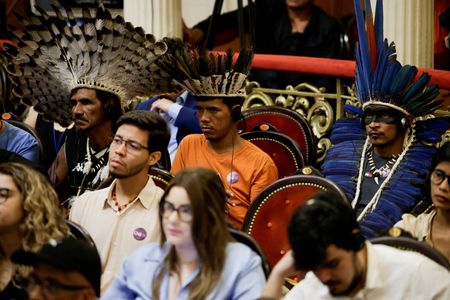By Jake Spring
SAO PAULO (Reuters) -Latin America's human rights court holds a final hearing in Brazil on Wednesday in a case that's part of a global wave of climate litigation, as several international courts prepare first-time opinions on what countries must do to combat climate change.
The rulings could also set off a wave of new litigation brought by citizens, businesses and governments.
Enforcement of such decisions is largely untested, however. A Swiss parliamentary committee last week rejected a ruling for example by a top European court that said Switzerland had violated the human rights of its citizens by not doing enough to prevent climate change.
The Inter-American Court of Human Rights (IACHR), which holds jurisdiction over 20 Latin American and Caribbean countries, hopes to issue its advisory opinion by year's end, top justice Nancy Hernandez Lopez told Reuters. The final hearing on Wednesday is being held in the Amazon rainforest city of Manaus.
Already last week, the international tribunal set up under the U.N. Law of the Seas decided that carbon emissions amount to marine pollution and that countries must go beyond the Paris Agreement to protect oceans.
Next year, the International Court of Justice (ICJ) is expected to have its say and could attempt to draw the earlier court decisions into one global ruling applicable to all U.N. members.
"The reason for (the wave of litigation) is people's deep frustration that their elected representatives are not taking rapid and fair climate action," said Lucy Maxwell, co-director of the nonprofit Climate Litigation Network.
"The climate litigation landscape is really broad and diverse and massively growing."
SETTING PRECEDENTS
While multilateral court opinions apply only to the states under their jurisdiction, they are all grappling with the same central question: Are governments obligated to protect people from climate change? And if so – to what degree?
That question is taking courts into uncharted territory, as there is little legal precedent on climate change. In deliberating, court judges have been reviewing climate science, holding hearings and digging through a tangle of laws, treaties and U.N. proceedings.
That process has made the case before the Inter-American Court the largest to date – with more than 600 participants at hearings held in Brazil and Barbados, as well as 262 written submissions to the court from Indigenous groups, civil society, scientists and one company.
Such inclusivity helps give the court its reputation among the world's most progressive, lawyers said.
By comparison, the International Court of Justice has restricted submissions in its case mostly to countries and authorities like the World Health Organization.
The Latin American court might also borrow arguments from earlier national climate cases, even if they are outside its jurisdiction, said senior lawyer Sophie Marjanac at the legal charity ClientEarth.
"The judges do read each other's opinions," Marjanac said, though whatever influence one ruling has on another might be "more psychological and social than legal."
As such, the Latin American court could influence the ICJ ruling, expected next year.
LEGAL SCOPE
Globally, most past court decisions on climate have focused on countries causing harm by failing to sufficiently cut greenhouse gas emissions, including last month's ruling against Switzerland.
But the opinion from the Inter-American Court could go further by ruling on whether states also must adapt to climate change or pay for damages already caused by climate extremes, Maxwell said.
The court could address protections for environmental defenders, given Latin America accounts for the vast majority of such activists who are murdered, said climate litigation expert Joana Setzer at the London School of Economics.
It could also address fossil fuels, the main cause of climate change, or spell out the extent to which countries must regulate polluting companies, said climate justice attorney Nikki Reisch at the Center for International Environmental Law.
WHAT COMES NEXT?
The multinational court decisions, once released, should provide clarity and guidance for national judges hearing climate cases. But they could also touch off a new wave in climate litigation, lawyers and judges told Reuters.
Major differences between international court decisions could trigger fragmentation where climate change rules differ between regions.
For the ICJ to declare that greenhouse gas emissions contribute to harming other countries "would be already a huge victory," given the court's wide jurisdiction, Setzer said.
Following the Inter-American court's decision, the governments under its jurisdiction will need to align their laws with the ruling or risk being sued, said Ciro Brito, a lawyer at Brazil's Instituto Socioambiental, an environmental and Indigenous rights nonprofit in Brazil.
It could give an immediate boost to a handful of legal cases already filed against governments in the region, including one filed by Mexican youths and another demanding more action from Brazil to fight Amazon deforestation.
Globally, Maxwell counted at least 100 cases pending in national courts accusing governments of failing to meet climate obligations, among many more filed against companies and other defendants.
Other lawyers said they were poised to take action once the Inter-American Court issues its opinion.
"We will use this opinion not only to knock on the government's door and say, 'You have to do this,'" said Guilherme Lobo Pecoral, a lawyer for children's rights nonprofit Alana Institute in Brazil.
"We will also knock on judges' doors and say, 'We have this internationally defined obligation and the state isn't following it.'"
(Reporting by Jake Spring, Additional reporting by Bruno Kelly in Manaus and Katy Daigle in Washington; Editing by Katy Daigle and Rod Nickel)









